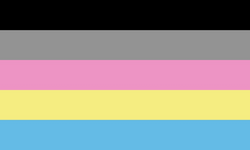Polygender
Polygender, poly-gender, or polygendered (from Greek poly "many" + gender)[1] is a nonbinary gender identity in which a person feels that they have more than one gender identity, or that they express "characteristics of multiple genders, deliberately refuting the concept of only two genders,"[2] as it was described in 1995, so it was in use by at least that year, if not earlier.[2] Polygender is one of the common nonbinary identities today. In 1998, the word polygender was used in a transgender community on the Internet called Sphere as an umbrella term for trans people whose genders were outside the binary:
 | |
| Related identities | Pangender, Trigender, and Multigender |
|---|---|
| Under the umbrella term | Nonbinary |
| Frequency | 0.2% |
| Click here to see alternative flags! | |
"Polygendered people are transgendered. [... There are trans men and trans women.] And then there are us, the less well-known transgender folks. We are people who identify as bi-gendered, non-gendered, or third-gendered. We may feel we belong to more than one gender, that we have no gender at all, or that we are our own gender, something neither male nor female. [...] Just like any other transgendered people, we might have a different name for ourselves than the gendered name we were given at birth; we might dress differently than most people of our birth gender and try to 'pass' as another gender on a daily basis; we might take hormones or get operations to modify our bodies. The difference is that we are not 'switching' from female to male or vice versa; we are going from living as female to living as both female and male, or living as a gay man and a lesbian and a teenage boy and a drag king, or living as no gender at all, ambiguously, or as something entirely other. [...] If you live in a big city or one which has a strong queer community, transsexuality is likely to be better understood, and there may even be laws protecting you from discrimination and guidelines for how your place of employment should deal with your transition. But if you live in one of those places and say that you are a male-to-both transsexual, that you want hormones to pass better as both genders or an operation to give you intersexed genitalia, you will get the same reaction as a 'normal' transsexual living in Queerphobiaville." - Polygender FAQ. [3]
In this definition, polygender was an umbrella term that included a variety of kinds of people who identify outside the gender binary, even those who are genderless, who could be transitioning (or not) by a variety of different methods. During the 1990s, any genders outside the binary were not widely recognized. The same article also used the word "queergendered" interchangeably with "polygendered" as umbrella terms for people who identify outside the gender binary in any way, which seems to have been an early permutation of the now widely-known word "genderqueer."
DemographicsEdit
In the 2016 Nonbinary/Genderqueer Survey, 7 of the respondents (0.23%) were polygender.[4] In the 2019 Worldwide Gender Census, 24 of the respondents (0.21%) were polygender.[5] In the 2020 Gender Census, 48 people (0.20%) were polygender.[6]
See alsoEdit
ReferencesEdit
- ↑ "Poly-" Dictionary.com. https://www.dictionary.com/browse/poly- Archived on 17 July 2023
- ↑ 2.0 2.1 Gary Bowen. "A Dictionary of Words for Masculine Women." May 15, 1995. Retrieved November 5, 1996. https://web.archive.org/web/19961105010926/http://www.ftm-intl.org/Wrtngs/ftm-words.gary.html
- ↑ Danica Nuccitelli. "Polygender FAQ." Sphere. May 26, 1998. http://gender-sphere.0catch.com/polygenderfaq.htm
- ↑ "NB/GQ Survey 2016 - the worldwide results." Gender Census. March 19, 2016. http://gendercensus.tumblr.com/post/141311159050/nbgq-survey-2016-the-worldwide-results Archived on 17 July 2023
- ↑ "Gender Census 2019 - The Worldwide tl;dr." Gender Census (blog). March 31, 2019. Retrieved July 7, 2020. https://gendercensus.com/post/183843963445/gender-census-2019-the-worldwide-tldr Archive: https://web.archive.org/web/20200118084451/https://gendercensus.com/post/183843963445/gender-census-2019-the-worldwide-tldr
- ↑ GC2020 Public Copy, 1 November 2020 Archived on 17 July 2023